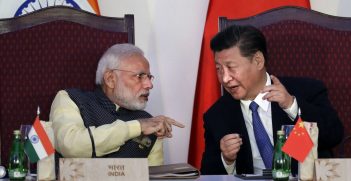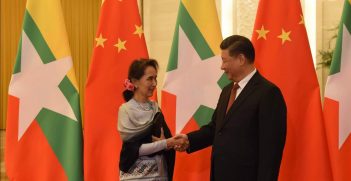First Stalled, Now at Full Sail: China's Rush Toward a South China Sea Code of Conduct

The march toward a Code of Conduct for partners in the South China Sea has been a long one, fraught with interruption, deception, and acrimony. While China’s renewed effort to conclude the negotiations is admirable, many are wary of its true intentions.
Jakarta has commenced its ASEAN chairmanship by announcing earlier this year that ASEAN countries and China will sit down in March for the first round of negotiations to finalise the South China Sea (SCS) Code of Conduct (COC). This announcement marks a continued effort to resume the long and tedious process of negotiation after talks stalled during the pandemic. Twenty-one years ago, ASEAN and China signed the Declaration on the Conduct of Parties in the South China Sea (DOC), committing the parties to de-escalation and working towards a COC. The COC is expected to be a broader, potentially legally binding document that could effectively reduce the risk of conflict, manage tension, and set the foundations for greater cooperation and eventually dispute resolution.
Resumption of COC negotiations should, therefore, be good news. The great fear is that China’s pursuit of the COC may not be actually working to promote regional stability. For years, the PRC has refused to negotiate on COC terms with ASEAN, insisting rather on dealing with SCS claimants on a bilateral basis. To be sure, this strategy was employed to take advantage of evident power asymmetries. It was not until 2013 that Beijing began working with ASEAN more earnestly, which occurred at the same time the Philippines approached the Permanent Court of arbitration for resolution over China’s nine-dash line claims to 90 percent of the SCS. As the resulting court ruling was not in Beijing’s favour, re-attaching its interests to the COC could simply be a way for China to undo reputational damage.
Promises of the COC are also commonly seen as a way for China to buy time and appease Southeast Asian claimant states while changing facts on the ground. With land reclamation projects wrapping up, and at least three of China’s controlled features being fully militarised, it is convenient timing for Beijing to re-join the negotiating table for a regional Code.
Another motive for China to pursue the COC is to keep the US out of the disputes. Washington has become less neutral on the matter in recent years, pronouncing China’s claim to offshore resources as “completely unlawful” and vouching support for Southeast Asian claimants. In these efforts, the Biden administration has been attempting to upgrade its relationship with Hanoi to a “strategic partnership,” and earlier this year was granted access to four additional bases in the Philippines, on the edge of the SCS and close to Taiwan. These developments have certainly incentivised China to pursue the Code. At the very least, such actions will serve as a demonstration that ASEAN and China are capable of handling their own disputes, and that the Washington’s involvement is unnecessary, if not outright disruptive.
China has not tried to be discreet about these intentions. In his five-nation tour of Southeast Asia last year, then Chinese Foreign Minister Wang Yi stressed the need to complete the COC in order to ensure that the “future of our region is in our own hands,” while warning countries about “being used as chess pieces in major power rivalry.” The Global Times, a Communist Party backed paper, has consistently reported on COC cooperation in the context of Washington’s “destabilising” intervention – visualised and caricatured through cartoon illustrations of Kamala Harris and Joe Biden physically stirring up the SCS.
These observations support the notion that China’s negotiation of the Code is driven more by self-interest and less by genuine desire for stability in the SCS. Put differently, China will continue to put pressure on ASEAN to weaken the Code in its favour. The Single Draft Negotiating Text of the COC (made available in 2018), for instance, was released without the phrase “legally-binding,” a much-anticipated feature of the document. Specific mechanisms to investigate and discipline in the event a party is accused of violating the Code were also missing from the text. If ASEAN does not fight for a revision of this draft, analysts warn that the Code risks becoming a much publicized and costly failure.
In an already beleaguered and lengthy debate (going on since 2002), these limitations have raised even more concerns. Indeed, it is often pointed out that ASEAN is deeply divided on this matter and cannot act effectively to push back against China’s demands. Although it is true that not all ASEAN member states are directly involved in the SCS dispute, it should be recognised that a divergence of interests does not equal an absence of mutual goals. That SCS distant members of ASEAN – Laos, Cambodia, and Myanmar – continue to defer to China on such matters, makes COC negotiations with ASEAN more laborious and unfulfilling.
At a fundamental level, ASEAN countries all share a desire to prevent unnecessary and rapid escalation of SCS conflicts that could lead to the total deterioration of their relationship with China. They also all prefer to manage the SCS dispute through an ASEAN-led approach, and desire not to get caught up in US-China power struggles. It is notable that despite years of uncooperativeness on the behalf of China, the ten ASEAN countries have been persistent in their efforts to engage with China and to produce a sufficient COC. Speaking as ASEAN Secretary General at the time, Vietnam’s Le Luong Minh stated that “it is the view of the ASEAN countries that the COC must be a legally-binding instrument,” demonstrating that the continual struggle to resist a watered-down iteration of the Code will preoccupy ASEAN’s leaders.
While nothing can guarantee that such efforts from ASEAN will not be in vain, given China’s previous disingenuity, at this point, the struggle for an adequate COC is far from over. Announcing the upcoming round of COC negotiations, Indonesia’s Foreign Ministry told the press that “new approaches” will be explored to navigate the increasingly “destabilised” sea.
In exploring these “new approaches,” it is important for ASEAN to not fall victim to pressure from China to deliver and thereby rush to complete an insufficient Code that could damage its reputation and fail to shore up SCS rules against the turbulent swell of regional conflict.
Minh Phuong Vu is a PhD candidate at the Department of International Relations, Coral Bell School of Asia Pacific Affairs, College of Asia & the Pacific, Australian National University (ANU). Her research interests include territorial disputes in the South China Sea, Vietnamese foreign policy, and China’s influence in Southeast Asia.
This article is published under a Creative Commons License and may be republished with attribution.





